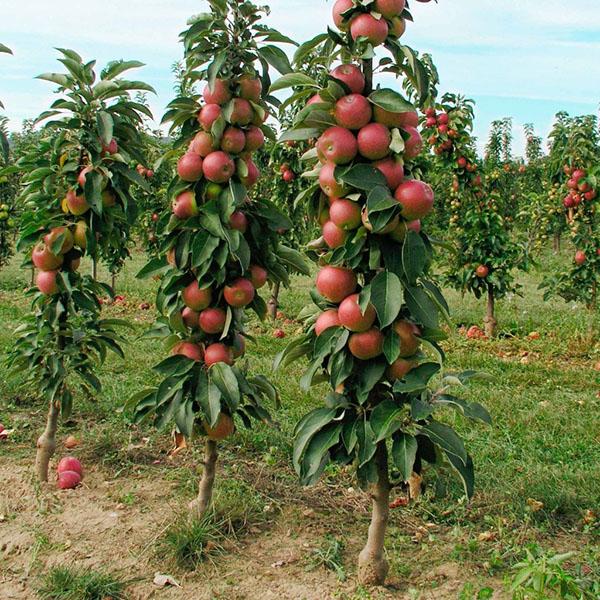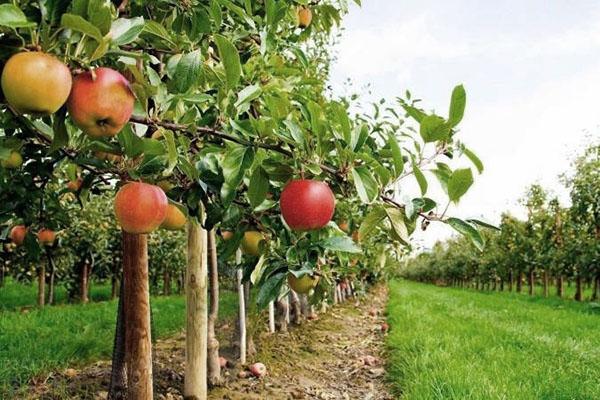Columnar fruit trees will find their place in your garden
 Columnar fruit trees have an unusual compact shape. This allows you to organize a garden even in a very limited area, and use the phenomenon when organizing landscape design.
Columnar fruit trees have an unusual compact shape. This allows you to organize a garden even in a very limited area, and use the phenomenon when organizing landscape design.
What are they, columnar fruit trees

Using breeding methods, based on this feature, varieties with a compact arrangement of branches and fruits were obtained. The height of such plants is no more than 250 cm. Their crown does not grow in breadth, and rarely exceeds 50 cm in diameter.
Fruit trees, columnar in shape, allow you to quickly and easily harvest, and organize a garden on almost any, even a very small, plot.
Advantages and disadvantages of a columnar shape
 Giving preference to a columnar shape when choosing a fruit tree variety, it is necessary to take into account not only the existing advantages, but also disadvantages.
Giving preference to a columnar shape when choosing a fruit tree variety, it is necessary to take into account not only the existing advantages, but also disadvantages.
The pluses include:
- The compactness of the crown.
- Low tree height.
- Convenience of harvesting.
- Good yield.
- Simplicity of care.
- High survival rate of seedlings.
- The possibility of planting a tree in a limited area.
- Unpretentiousness.
The disadvantages of columnar fruit trees include:
- Weak superficial root system.
- No resistance to strong wind.
- The need to maintain the shape of the tree, regular trimming.
- Periodic fertilization must be ensured.
- Severe soil depletion.
- Not the duration of the fruiting time - up to 15 years.
- Columnar seedlings cost more than conventional varieties.
- Curvature of the trunk is possible.
- Crown formation requires skills.
Columnar trees have their own characteristics and disadvantages. But in some cases, it is the varieties of such an organization that allow you to plant a whole garden and have a good harvest from a plot of modest size.
How to avoid mistakes when planting a seedling
 Seedlings of columnar varieties visually differ from ordinary ones - they are thicker and do not have branched lateral shoots.
Seedlings of columnar varieties visually differ from ordinary ones - they are thicker and do not have branched lateral shoots.
Purchase recommendations:
- To be sure of purchasing a columnar seedling, it is recommended to buy it in specialized stores or nurseries.
- The variety must be adapted to the local climate.
The recommended time for planting a new seedling is autumn, but planting can also be carried out in the spring. The soil should be loose, loamy or sandy loam with high-quality aeration.
A plot to be allocated for columnar fruit trees, preferably sunny and protected from the wind.
Work order:
- Dig a hole. If you plan to plant several trees, then the distance between them should be about 1 m, and between the rows - 1.5 m.
- Fertilizers, phosphate and potash, are poured into the hole, and humus.
- A seedling is placed in the prepared place.
- Spread the roots.
- Cover the roots with earth.
- They compact the soil.
- Watering is carried out.
A seedling planted before winter must be covered with sacking for the cold season.
Highlights of tree care
 Columnar trees are considered to be much easier to care for than traditional varieties.But you will not be able to completely avoid leaving.
Columnar trees are considered to be much easier to care for than traditional varieties.But you will not be able to completely avoid leaving.
Trimming to shape
 Pruning columnar trees is a must. Despite the specificity of the variety, the plant is capable of forming lateral branches. This can lead to damage to the top, for example, as a result of severe frost.
Pruning columnar trees is a must. Despite the specificity of the variety, the plant is capable of forming lateral branches. This can lead to damage to the top, for example, as a result of severe frost.
 In the event that the upper kidney is damaged, it is necessary to leave only one side branch, which will take over the function of the main one, and cut off the rest. All cut points are then treated with garden varnish to prevent infection of the tree and attack by parasites.
In the event that the upper kidney is damaged, it is necessary to leave only one side branch, which will take over the function of the main one, and cut off the rest. All cut points are then treated with garden varnish to prevent infection of the tree and attack by parasites.
Pruning rules:
|
Season
|
Work order |
Note |
| Spring | Removing weak and thin branches | Work in early spring |
| Summer | Pinching of side shoots | To keep fit |
| Autumn | Fighting thickening and shortening the trunk | — |
| Winter | No trimming | — |
Proper pruning helps to increase yields and maintain the crown shape characteristic of the variety.
Top dressing of columnar trees
 The shallow root system and abundant fruit formation contribute to soil depletion. Periodic feeding with complex fertilizers will help to compensate for this.
The shallow root system and abundant fruit formation contribute to soil depletion. Periodic feeding with complex fertilizers will help to compensate for this.
They do it according to the following scheme:
- In the fall - phosphorus and potassium to maintain the tree in anticipation of frost.
- In the spring, ammonia-nitrate mixtures are introduced to increase yields.
When applying fertilizers, the rate must not be exceeded.
Other care features
 Before the beginning of the flowering period, trees are sprayed with insecticides-acaricides for prevention purposes. In the first year, the flowers that appear should be removed in order for the young plant to take root better. Already next year, it is allowed to leave half the buds, and in the future - to get a full harvest.
Before the beginning of the flowering period, trees are sprayed with insecticides-acaricides for prevention purposes. In the first year, the flowers that appear should be removed in order for the young plant to take root better. Already next year, it is allowed to leave half the buds, and in the future - to get a full harvest.
 Watering of plants, especially young ones, must be ensured in accordance with conditions and weather factors. In the hot season, in the absence of rain, it is necessary to ensure watering every 7 days.
Watering of plants, especially young ones, must be ensured in accordance with conditions and weather factors. In the hot season, in the absence of rain, it is necessary to ensure watering every 7 days.
 Growing columnar forms is not only practical but also aesthetically interesting. Having learned how to properly care for plants of unusual shape, you can get an amazingly beautiful garden - the highlight of your site.
Growing columnar forms is not only practical but also aesthetically interesting. Having learned how to properly care for plants of unusual shape, you can get an amazingly beautiful garden - the highlight of your site.
Thank you for such a detailed description. I will definitely buy such a variety of apple trees for my dacha.